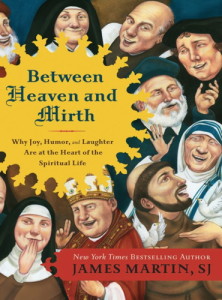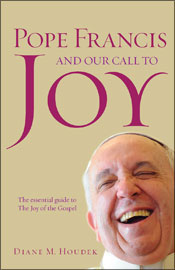
If you are engaged in a serious and sustained practice of silent prayer and contemplative spirituality, then you need to be a very somber, sober, and serious person, for the mystical life is no laughing matter. . . . April Fool!
I was inspired to write about this topic not only because today is April 1, but also because of what is arguably the single most problematic topic in the Rule of Saint Benedict — laughter. Consider these tidbits:
Do not say foolish things or things that are intended to cause laughter. Do not take pleasure in excessive or unrestrained laughter. (from Chapter 4)
We condemn jokes and idle gossip and anything said to make others laugh, and we ban such things from all places: the disciple is not allowed to open his mouth to say things of this kind. (from Chapter 6)
Avoid being easily provoked to laughter, for it says in Scripture that ‘the person who raises his voice in laughter is a fool’ (Sir. 21:20)… Speak gently and without laughter, but with humility and seriousness, saying only a few, reasonable words, and not speaking in a loud voice, for as it is written, ‘The wise man is recognized by his few words.’ (from Chapter 7)
What a sourpuss!
Fortunately, nobody thinks that the Rule is inerrant, and so the most honest thing to say, is that here’s a place where Saint Benedict gets it wrong.
One way to interpret these verses is to speculate that Saint Benedict wanted to prohibit the kind of laughter that laughs at another — the laughter of derision. Which is different from the laughter of delight, which is never at another’s expense but is purely an expression of joy. Granted, this is an act of re-interpretation: Saint Benedict himself probably really was opposed to all types of laughter, good and bad. But I think it is a practical approach.
Thankfully, Saint Benedict notes that “This rule is only a start on the path to justice” (chapter 73) and freely invites the reader to change or adapt his schedule for praying the psalms (chapter 18), both of which suggest to me that Benedict was humble enough to understand that his ideas were hardly the last word on things. So we can re-interpret Benedict’s understanding of laughter without having to chuck the Rule in its entirety.
So my purpose in writing today is to reflect on what a healthy relationship between contemplation and laughter really can be. I’m writing especially for Benedictine oblates and Lay Cistercians and others who are not monks or nuns but who turn to Saint Benedict for spiritual guidance — although I think anyone interested in a spirituality grounded in silence and contemplation might want to reflect on this issue. What does it look like to be a joyful contemplative?
And I’ve already mentioned the important first clue: the importance of recognizing the difference between derision and delight. Contemplation is grounded in compassion, so I think it’s intuitive for contemplatives to recoil from laughter that comes at another person’s expense. Which is not to say we don’t sometimes do it. I’ll confess to have made a joke at the expense of a politician or pundit with whom I disagree. It’s an easy laugh — but it’s not an edifying one. And so I thank Saint Benedict for giving me pause to consider that laughter or playfulness comes in different forms, and not all are icons of the love of God.
But the more I discern the need to let go of the laughter that puts someone else down, the more convinced I am that a truly contemplative spirituality is nevertheless filled with healthy joy and laughter and happiness — only it’s the laughter of a smiling baby, the joy of a person in love, the happiness that emerges from an in-your-bones ability to radically trust the Love of God.
Sometimes when I am sitting in silent prayer, I break out in a big spontaneous smile. Nothing in particular causes it — it’s just a joy that wells up from deep within. It’s happiness at being alive, it’s serotonin set aflame by the presence of God, even if I don’t consciously feel such presence.
I’ve recently come across two books that I find encouraging for my conviction that contemplation is a fundamentally happy endeavor. The first, by the wonderful Jesuit author James Martin, is Between Heaven and Mirth: Why Joy, Humor and Laughter Are at the Heart of the Spiritual Life. The title really says it all; Martin weaves together his gentle writing style with plenty of stories drawn from his own life and the lives of the saints — and he is clear in showing how the root of all the goofiness and happiness is joy, which after all is one of the Fruits of the Spirit (see Galatians 5:22).

This takes me to the second book that has inspired me: Pope Francis’s 2013 Apostolic Exhortation, Evangelii Gaudium: The Joy of the Gospel. The Pope, who himself is quite a smiler, emphasizes that joy is an integral characteristic of the Christian message, and that all the activities of the life of faith — from prayer to liturgy to missional activity and evangelization — need to be grounded in joy in order to be truly consistent with the Gospel. In other words, joy is not some sort of religious add-on; it’s central to the message that God loves us and wants what’s best for us. So if we get into sourpuss-land (or, for that matter, derision-ville), then something is out of joint. We need to re-calibrate our faith by the radiance of delight.
So Happy April Fool’s Day — and don’t let the sourpuss saints fool you. Be silly (I love how the word “silly” in its Germanic root is related to selig which also means “blessed”!) and fearlessly be a fool for Christ’s sake (I Corinthians 4:10). Be joyful in your faith, in your prayer, in your contemplative living. Silence is a gateway to splendor and felicity. Let the joy flow!
Is there something special you do to nurture happiness and joy in your faith journey? I’d love to hear about it — please leave a comment below.
Enjoy reading this blog?
Click here to become a patron.


















